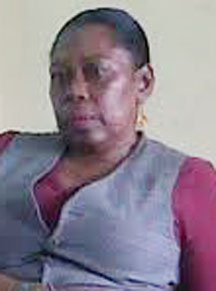The University of Guyana Senior Staff Association (UGSSA) and the University of Guyana Worker’s Union (UGWU) are proceeding with plans to resume protests at the Turkeyen Campus today to press for better salaries, benefits and working conditions.
“We are reasonable people, we thought that it would be good to wait and consult with them… they have dishonoured the agreement. Yesterday (Monday) we assembled for the first rounds of talks but the council did not show up. Everyone else did. If our meeting is not important to the government officials, because those were the persons nominated to attend the meeting, then we have the right to protest,” President of the UGSSA Dr Patsy Francis told Stabroek News yesterday.

The decision to resume industrial action was taken after members of the University Council’s negotiating team failed to attend the meeting to commence negotiations on the memorandum of demands submitted by the unions.
Two weeks ago, Francis had announced that if no development in plans to start projects on the campus occurred, then the unions would be forced to recommence their picketing. Plans changed last week after the administration contacted Francis and indicated that a meeting would be called to begin consultations.
When this newspaper contacted Francis yesterday, she noted that a 48-hour notice had to be given prior to industrial action. Plans have been made to gather and picket at the Turkeyen Campus today.
Salaries
According to the Memorandum of Demands released by the UGSSA on Monday, they are seeking an increase in salaries and a review of benefits available to them.
Their proposal argues that that the salaries of academics and other full-time and part-time University Association staff should be increased within a three-year timeframe, leading to parity (in terms of purchasing power) with salaries at other regional tertiary institutions. In addition, they say emoluments and benefits should be revised to match those offered by competing institutions and salary scales should be expanded and overlap of scales be minimized and bands within scales be revised to reflect improved annual merit increments.
Outgoing Vice-Chancellor Professor Lawrence Carrington, in a farewell address to staff at the start of the year, identified the university’s staffing, staffing policy and competitiveness as an employer as areas where there is significant unfinished business. He said the “elephant in the room” was staff salaries, noting that they were crucial to ensuring the university’s competitiveness. “If all we can offer a professor at the top of our scales is the equivalent of US$1,725, we will not be able to compete with a Caribbean competitor offering the equivalent of US$8,429 at a comparable level. So our planning has to shift the matter of emoluments to the top of the agenda,” he recalled telling the last annual business meeting of the University Council held in November last year.
Benefits and
allowances
The UGSSA proposal also calls for the medical coverage available to be widened and for coverage to extend to retirees. In addition, it seeks to have duty-free concessions restored to all staff from Administrative Officer level every three years, with long service employees from that level who have completed over 10 years’ service being offered concessions even if they are nearing retirement age.
A review of the pension/gratuity scheme is also being sought, annual ‘local’ leave that has no work requirement and/or reporting and terminal leave benefit for Assistant Deans and Heads of Department.
In the area of allowances, the UGSSA is asking that the full quantum of the Leave Passage Allowance – equivalent of airfare to the United Kingdom – be honoured. Also, it wants academic staff to be granted per diem for no less than two weeks at the rate of US$150 per day for approved study programmes during study leave and sabbatical leave for research conducted both overseas and locally (when in regions outside their home). It says for lecturers who have to supervise students in locations outside of the university, it wants the “undignified practice” of offering only partial minibus fare reimbursement for travel expenses within Guyana for staff members who do not possess their own means of transport to come to an end. Instead, it says full taxi fares should be paid upon submission of receipts. The proposal says travelling allowance should be tripled for each category due to the fact that no revision has been done for more than 13 years and transportation costs have more than tripled.
Other demands include an increase in the book allowance and academic materials allowance to US$500 per year per staff; that annual research grants of the equivalent US$1,250 be offered to all academic staff on a use or lose basis to pursue their research agenda; that a conference and tours grant be provided annually to all academic staff to be used to present papers at approved conferences overseas and locally to the tune of US$1,000, and US$500 for young staff to attend conferences, meet, interact and collaborate with and learn from colleagues working in their field. The proposal also calls for UG to recommence funding staff development programmes for lecturers with only bachelor degree qualifications to upgrade their qualifications.





